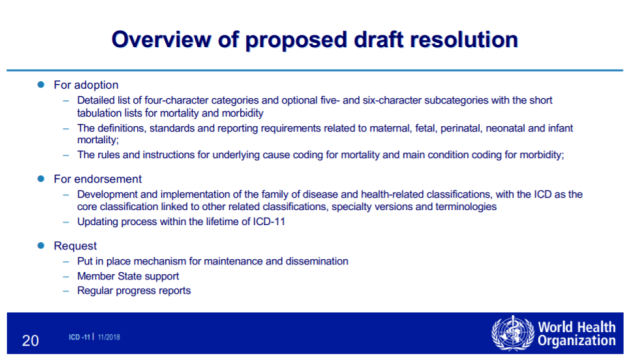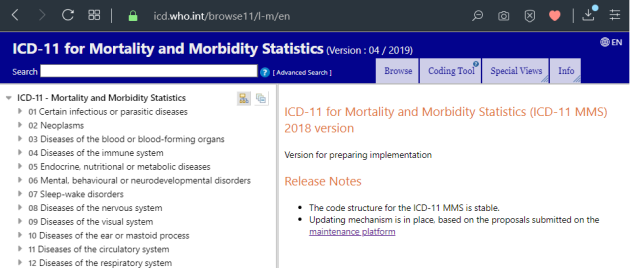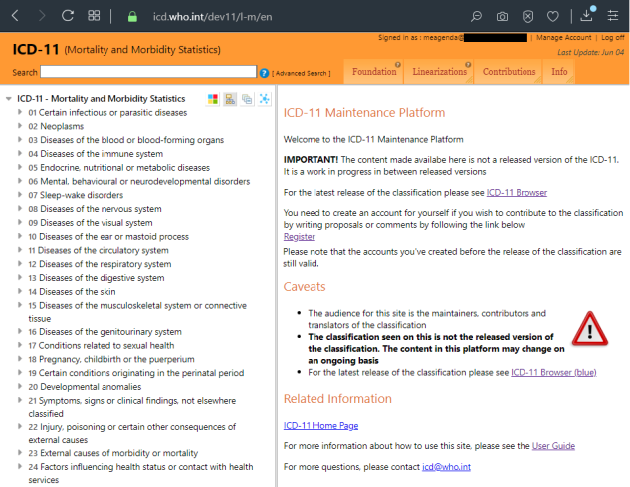ICD-11 implementation package
June 6, 2019
Post #353 Shortlink: https://wp.me/pKrrB-4R7
On Saturday, May 25, 2019, member states meeting at the 72nd World Health Assembly voted unanimously to approve the draft resolution to adopt the Eleventh revision of the International Classification of Diseases. The resolution passed with no amendments.
Adoption comes into effect on January 1, 2022, subject to transitional arrangements. After this date, member states can start using or transitioning to the ICD-11 codes when they have prepared their health systems for migration from earlier editions.

Source: Presentation slides: Dr Robert Jakob, November 2018 Information session on ICD-11
The two key documents for Agenda Item 12.7 Eleventh revision of the International Classification of Diseases are:
A72/29 Add.1
Eleventh revision of the International Classification of Diseases
Draft ResolutionA72/29
Eleventh revision of the International Classification of Diseases
Report by the Director-General
Implementation package
The World Health Organization (WHO) has prepared an implementation package. These tools can be accessed at ICD-11.
1) ICD-11 Implementation or Transition Guide (version 1.05, May 2019)
This document is a part of the ICD11 implementation package¹ developed by the World Health Organization. This document also provides some background related to the development of the ICD11 and its components. The document outlines essential issues that countries need to consider in the lead up to and during the transition from an existing ICD environment to the eventual implementation of ICD11.
1 The ICD-11 implementation package comprises the Classification System, the Coding Tool, Browser and all supporting documents including the Reference Guide and Implementation Guide, and a set of tools. Source: ICD-11 Implementation or Transition Guide, Geneva: World Health Organization; 2019; License: CC BY-NC-SA 3.0 IGO.
Index based search tool.

See Additional resources [1] for NHS overview of ICD-11 Coding Tool.
3) ICD-11 browser for Mortality and Morbidity Statistics (MMS)
Blue ICD-11 MMS platform (current release: 04 / 2019)
English: https://icd.who.int/browse11/l-m/en
Spanish: CIE-11 para estadísticas de mortalidad y morbilidad (Versión : 04 / 2019): https://icd.who.int/browse11/l-m/es

See Additional resources [2] for NHS overview of ICD-11 MMS Browser and [3] for general overview of ICD-11.
4) ICD-11 Reference Guide (version 11-04-2019)
Detailed guide to ICD-11 and how to use it; update and maintenance workflow; updating cycles; requirements for proposal submission.
5) ICD-10 / ICD-11 mapping Tables
Map ICD-11 codes to and from ICD-10 (links to Zip file; crosswalks in Text and MS Excel formats)
6) Orange ICD-11 Maintenance Platform
English: https://icd.who.int/dev11/l-m/en
The audience for this site is the maintainers, contributors and translators of the classification. The content of the Orange browser is not the released version of the classification. The content is updated on a daily basis to incorporate changes approved since the most recent release of the Blue ICD-11 browser for Mortality and Morbidity Statistics (MMS).
The Orange Maintenance Platform incorporates the ICD-11 Proposal Mechanism (a proposal and commenting tool for which registration is required). Once an account is registered, new proposals, comments and suggestions for changes and enhancements to existing content can be submitted and notifications set up. For help with submissions see: Maintenance Platform User Guide.

Specialty versions and derived classifications
Specialty versions provide more detail for particular user groups, such as Mental Health, Neurology, Dermatology and less detail for primary care or low diagnostic resource settings.
For ICD-11, the WHO Department of Mental Health and Substance Abuse has developed a companion publication to ICD-11 Chapter 06 for mental health professionals, general clinical, educational and service use.
The Clinical Descriptions and Diagnostic Guidelines for ICD‐11 Mental, Behavioural and Neurodevelopmental Disorders (CDDG) provides expanded disorder descriptions and includes: essential (required) features, severities, boundaries with other disorders and normality, differential diagnoses, additional features and culture-related features.
WHO has given no firm release date but says the CDDG will be published “as soon as possible” following approval of the overall system by the WHA¹.
Also under development is the ICD-11 PHC – a clinical guideline written in simpler language to assist non-mental health specialists, especially primary care practitioners and non medically trained health workers, and for use in low resource settings and low- to middle-income countries with the diagnosis and management of 27 mental disorders. No finalization and publication date is available. Like the ICD-10 PHC (1996), this revised edition will not be a mandatory classification for member states.
1 Reed GM, First MB, Kogan CS, et al. Innovations and changes in the ICD-11 classification of mental, behavioural and neurodevelopmental disorders. World Psychiatry. 2019;18(1):3-19.
Linkages with other classifications and terminologies
ICD11 incorporates or links with the following classifications and terminologies through the ICD11 Foundation:
• International Classification of Disease for Oncology – ICD-O
• International Classification of External Causes of Injury – ICECI
• International Classification of Functioning, Disability and Health – ICF
• International Classification of Primary Care – ICPC [Ed: developed/maintained by WONCA]
• Other terminologies such as OrphaNet and SNOMED-CT
Source: ICD-11 Implementation or Transition Guide, Geneva: World Health Organization; 2019; License: CC BY-NC-SA 3.0 IGO.
Additional resources:
1 NHS Digital: ICD-11 Coding Tool Overview, September 2018
2 NHS Digital: ICD-11 Browser Overview, September 2018
3 NHS Digital: ICD-11 Overview
4 Presentation: Information session on ICD-11 Dr Robert Jakob, Team Leader, WHO, Geneva, Classifications, Terminologies and Standards, November 2018
5 Presentation: NHS Digital: Clinical Coding for non coders – Brief overview of clinical coding and the role of the Clinical Classifications Service
6 ICD-11: The 11th Revision of the International Classification of Diseases – Site maintained by eHealth DSI Semantic Community providing resources for ICD-10, ICD-11, ICD derivative classifications and other classification and terminology systems
